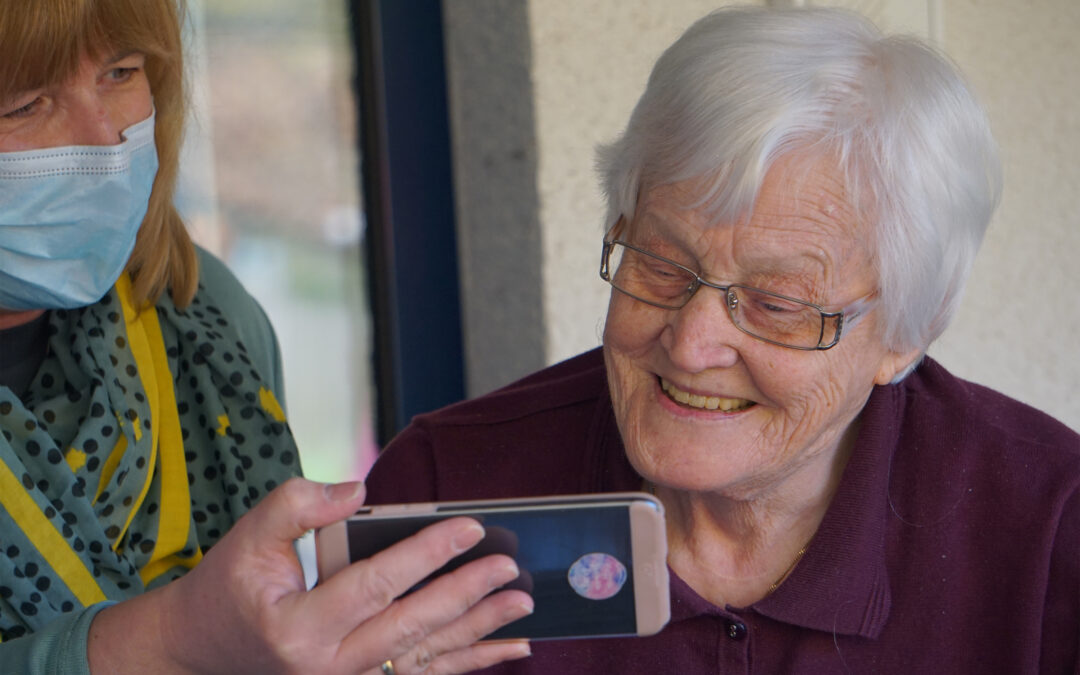Alzheimer’s and dementia shift roles in quiet ways at first, then in ways no family feels fully prepared for. Supporting someone at home takes time, creativity, and a growing toolbox of strategies that evolve with their needs.
In the United States, an estimated 6.9 million adults aged 65 or older are living with Alzheimer’s dementia, according to the Alzheimer’s Association. For many families in Wilmington and across North Carolina, home remains the preferred place for care rather than a memory care facility.
As you can imagine, home is where familiar surroundings and close relationships help reduce stress and confusion.
In this article, you’ll learn:
- What Alzheimer’s and dementia involve
- How in-home senior care for Alzheimer’s and support can protect safety, confidence, and connection
- Practical tips family members can use right away at home
- Communication strategies, services, and programs that help reduce stress
- When to consider professional in-home Alzheimer’s or dementia care
Understanding Alzheimer’s and Dementia
Alzheimer’s disease is the most common cause of dementia, but the two terms are not interchangeable. Dementia describes a group of symptoms that affect memory, reasoning, and behavior. Alzheimer’s is one specific form of the disease that gradually changes how the brain works over time.
Early signs often include forgetfulness that interrupts daily routines, trouble finding words, or difficulty making decisions. Later, changes may appear in behavior, sleep, or personality. Some seniors become anxious or withdrawn from the community. Others may show restlessness or confusion in familiar places.
These changes can make everyday tasks, like preparing a meal or remembering to lock the door, more difficult or unsafe. That’s why learning the basics of Alzheimer’s and dementia helps families anticipate needs and adjust personal care at home.
Key things to understand as a caregiver providing treatment:
- Dementia progresses over time, and needs will change too
- Behaviors are often symptoms of the disease, not personal choices
- Familiar routines and environments can reduce stress and confusion
- Compassion and patience make a meaningful difference each day
With a greater awareness of what’s driving the changes you’re seeing, you’re better equipped to respond to cognitive function changes with dignity-focused support.
Benefits of In-Home Alzheimer’s and Dementia Care
Home is often where a person feels most grounded. The structured environment brings things like a familiar scent of a favorite blanket, the creak of a well-worn floorboard, or the smile from the same neighbor each afternoon. All of these cues help someone with memory loss make sense of their day.
In-home Alzheimer care and in-home dementia care allow loved ones to stay connected to the place and people who bring comfort.
Comfort in Familiar Surroundings
As dementia progresses and memory issues develop, what feels overwhelming outside the home can feel simpler within it.
Meals happen in the kitchen they’ve known for years. Morning routines unfold in their own bedroom. These everyday touchpoints reduce confusion and anxiety, helping keep stress levels lower.
Personalized, Flexible Support
In-home care adapts to changing needs and different stages. A caregiver can adjust the pace of daily tasks, customize activities to match energy levels, help out with physical therapy, and create moments of joy using lifelong interests.
Think about the benefits of activities like gardening, playing favorite music, or participating in faith and family traditions. This flexibility around their own pockets of life supports dignity at every stage.
Stronger Family Connection
Keeping medical care at home allows the family to stay closely involved. Loved ones can share meaningful moments throughout the day — a reassuring hand, a story retold, a smile that still shines through.
Most families often feel more confident and supported when professional guidance is available right beside them.
Preserving Identity and Belonging
Even as memory changes and the disease progresses, the sense of self remains. Without the challenges of a nursing home, in-home dementia care helps protect that identity by honoring personal preferences, routines, and relationships.
Seniors can continue to live daily in ways that reflect who they are and the life they’ve built.
Practical Tips for Caring for Seniors with Alzheimer’s or Dementia
Even with a strong understanding of the health conditions that come with Alzheimer’s or dementia, day-to-day caregiving may feel daunting. Needs may shift from moment to moment, and what works one day may not work the next.
While there is no single right approach or a way to “solve” the challenges, these small, thoughtful strategies can make home life safer, calmer, and more enjoyable for everyone involved.
The following steps and resources offer a helpful starting point for families providing in-home Alzheimer’s care or in-home dementia care.
1. Safety at Home
Safety is one of the biggest priorities in in-home Alzheimer’s care. Memory changes can make familiar surroundings feel unpredictable, so small home adjustments go a long way in preventing injuries and keeping stress low.
By creating a safer environment, families can support freedom of movement and peace of mind.
- Improve lighting and remove tripping hazards like loose rugs
- Lock away medications and cleaning products
- Add grab bars or non-slip mats in bathrooms
- Use door chimes or alerts if wandering is a concern
2. Encouraging Independence
Dementia care for seniors builds confidence when the focus is on what someone can do.
Keeping routines simple and offering small choices (like picking between two outfits) helps maintain dignity. Guidance should be subtle, stepping in only when help is needed.
- Create a steady daily routine with familiar activities
- Set up tasks for success by simplifying steps
- Offer guided choices to support autonomy
- Use supportive seating or tools when dressing or bathing
3. Communication That Calms
As language skills change, communication becomes more than spoken words. A patient tone, gentle touch, and simple instructions can help reduce frustration for both caregiver and loved one.
The goal is comfort, not perfect accuracy.
- Speak slowly with short sentences and familiar words
- Use eye contact, smiles, and reassuring gestures
- Validate feelings rather than correcting mistakes
- Redirect to calming activities if frustration grows
4. Meaningful Activities
Purposeful engagement is a cornerstone of in-home dementia care. Activities tied to past interests (music, gardening, sorting photos) can spark positive memories and boost mood.
Keep sessions short and enjoyable, letting the moment guide the pace.
- Focus on long-time hobbies and interests
- Incorporate gentle movement like stretching or walking
- Include multi-sensory experiences (music, touch, nature)
- Invite simple social interactions with friends or neighbors
5. Memory Cues and Orientation
Clear cues help seniors move through the day more easily as they age. Labels, visual reminders, and an organized environment can prevent confusion and lessen the need for verbal prompting. This supports independence and reduces anxiety in daily routines.
- Label room doors, drawers, or cabinets
- Place a daily schedule or calendar where it’s visible
- Reduce clutter to limit distraction
- Keep important items in the same spot each day
6. Communicating Effectively with a Loved One
Words may become harder to find, but the need for connection remains strong. As language changes, the goal of communication shifts from exchanging information to creating comfort, trust, and calm.
Simple adjustments can make conversations feel easier:
- Use a relaxed tone and speak slowly
- Offer one idea or instruction at a time
- Validate emotions even if the facts aren’t correct
Non-verbal communication often speaks loudest. Don’t force a family member to search for words. A gentle touch, steady eye contact, or simply sitting together can help your loved one feel safe and supported.
Instead of focusing on what’s being forgotten, look for ways to keep connection at the center of each interaction.
Managing Caregiver Stress
Supporting a loved one with Alzheimer’s or dementia at home can be deeply meaningful, but it can also take a toll.
Caregivers often balance appointments, household tasks, behavior changes, and their own emotions, sometimes without many breaks. Feeling tired, overwhelmed, or unsure is a normal part of the journey.
Taking care of yourself helps you take better care of the person you love. Regular rest, shared responsibilities, and time spent on personal well-being protect your health and your ability to provide steady support day after day.
- Accept offers of help from family, friends, or neighbors
- Join a local area agency or caregiver support group to share experiences
- Build short breaks into each week to recharge
- Consider respite care for scheduled relief when needed
You don’t have to carry everything alone. Support allows you to show up with patience, compassion, and renewed strength.
When to Seek Professional In-Home Care
Knowing when additional help is needed can be one of the hardest decisions families face. Alzheimer’s and dementia progress differently for everyone, so there isn’t a single moment that signals it’s time. Instead, caregivers often notice gradual changes: moments when home feels less safe, or daily routines feel harder to manage alone.
Professional in-home Alzheimer care and in-home dementia care can provide the structure, trained support, and peace of mind families need. Bringing in help doesn’t replace your role, but rather reinforces it, allowing you to focus on connection instead of constantly reacting to challenges.
Here are some early-stage signs that it may be time to add support:
- Increased falls, wandering, or changes in mobility
- Difficulty with bathing, toileting, or medication management
- Rising caregiver stress or exhaustion
- Behavioral changes that feel unsafe or overwhelming
Asking for help is a step toward safer, more secure days for both your loved one and you.
FAQs About Alzheimer’s and Dementia Care at Home
Here are common questions about alzheimer’s and dementia care at home.
What is the difference between Alzheimer’s and dementia care?
How can I make my home safer for someone with dementia?
Can in-home care improve the quality of life for seniors with Alzheimer’s?
Yes. Personalized routines, familiar surroundings, and one-on-one support can help reduce anxiety and keep older adults engaged in the activities and people they love.
How do I choose the right in-home care provider?
A Stronger Tomorrow Starts at Home
Caring for someone with Alzheimer’s or dementia is a journey that requires patience, creativity, and a whole lot of heart. Every small success is a reminder that connection still lives here.
With the right support, home can remain a comforting place where your loved one feels seen, valued, and safe.
If you’re starting to feel stretched or unsure about next steps, professional in-home care can make each day more manageable. In Wilmington and across the Cape Fear region, New Estuary Home Care provides personalized support designed to honor who your loved one is and the life they’ve built.
Compassionate care doesn’t replace family. It strengthens it.
Let’s take the next step together. Learn how we can help you create more good days at home. Contact us today!



